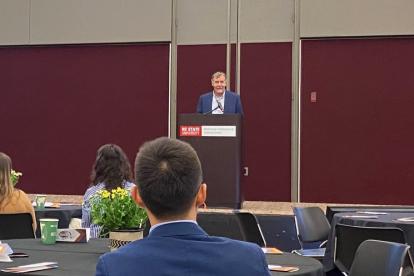
Victoria Hsiung, center, a research analyst with the Duke Global Health Innovation Center, and fellow GHIC staff Rianna Cooke and Katharine Olson at the North Carolina Global Health Alliance conference
Published October 10, 2022, last updated on October 28, 2022 under Around DGHI
When Chris Beyrer, M.D., was working to halt the spread of AIDS in Thailand in the 1990s, academic researchers had a significant factor on their side: the support of the Thai government. Open collaboration between researchers and policymakers, Beyrer said, helped led to steady declines in AIDS cases over the next decade.
Beyrer, now DGHI’s director, shared the example during the keynote address of the North Carolina Global Health Alliance’s conference on Oct. 6. He said it illustrates the importance of on-the-ground collaboration to achieve results.
“Today is really about impact,” Beyrer said. “Are we making [an impact], and what are the long-lasting impacts from the kind of work we all engage in? It’s the collaborations and health impacts that matter.”
More than a dozen other DGHI faculty, staff, students and alumni participated in the event, held at North Carolina State University. Several undergraduate and graduate students presented posters at the conference, on topics such as cigarette smoking intervention and understanding COVID-19 vaccine hesitancy in young adults.
Below are highlights from DGHI participants at the event.

DGHI director Chris Beyrer delivers...
An Alumna’s Work on HIV and Drug Use
Kelsey Landrum, a 2020 graduate of DGHI’s Master of Science in Global Health program, has always had an interest in epidemiology and how it ties to health policy and implementation science. Now a Ph.D. candidate at the University of North Carolina at Chapel Hill’s Gillings School of Global Public Health, she is researching the effectiveness of mental health and peer counseling interventions in Vietnam for people who use drugs while living with HIV.
She said work on the project has shown her how to listen more and be willing to adapt, noting the intervention she is studying was originally used in Zimbabwe.
“Part of the formative work was translating interventions and therapy discussions for this environment,” she said. “Overall, the importance of listening to our participants was our goal, learning from them to adapt this intervention. If we didn’t do the formative work, we would’ve missed barriers to care.”
Cervical Cancer Screening in the Pandemic
Megan Huchko, M.D., has researched cervical cancer and care in Kenya for 15 years. During a panel discussion about screening for cervical cancer and HPV, she talked about the shift to self-collection tests to deal with privacy and logistical concerns.
“There’s also the workforce limitation where there’s not enough people to do exams, clinics may not have enough beds or speculums,” said Huchko, a DGHI professor of obstetrics and gynecology and global health. “Self-collection takes all the infrastructure [challenges] away and still provides an accurate response.”

Megan Huchko discusses self-testing as a...
Huchko and other panelists agreed self-testing is a potential solution to help close wide screening gaps in low- and -middle-income countries, but it also holds promise in high-income countries.
After the panel, Huchko, who also serves as director for the Duke Center for Global Reproductive Health, talked about her desire to see more countries adopting low-cost, sustainable testing models.
“{The goal is} a model where the governments we work with can take over and the partners who provide testing can move out,” she says, “I would like to see that where countries are able to fully fund the work.”
Poster Presentations
The following DGHI students and staff displayed posters at the NCGHA conference.
- Victoria Hsiung, Duke Global Health Innovation Center Research Analyst, “Data as a Catalyst: Case Studies of Social Enterprises Leveraging Data Innovations for Health Impact”
- Elena Johanson, MS-GH student, “Drivers of COVID-19 Vaccine Hesitancy among 20–30-year-olds in the United States - A Convergent Mixed Methods Study”
- Lisa Gachara, MS-GH student, “The Universal Language of Story | Developing a Model Narrative for Provider-Parent Interactions to Guide Child Vaccination Decisions”
- Ray Wang, global health master’s student at Duke Kunshan University, “Community-Centered eHealth Smoking Cessation Intervention, a Pilot Trial in China”
- Haley Cionfolo, global health undergraduate student, “A Comparison of Barriers to Accessing Neonatal, Child, and Adult Hearing Screenings”
- Nicholas Haddad and Advika Kumar, global health undergraduate students, “Developing a Community-Based Outreach Model to Address Transportation Barriers in Rural North Carolina”


